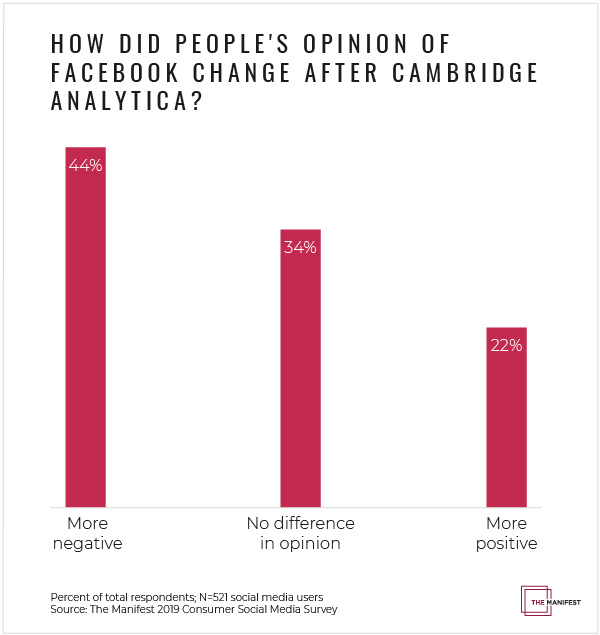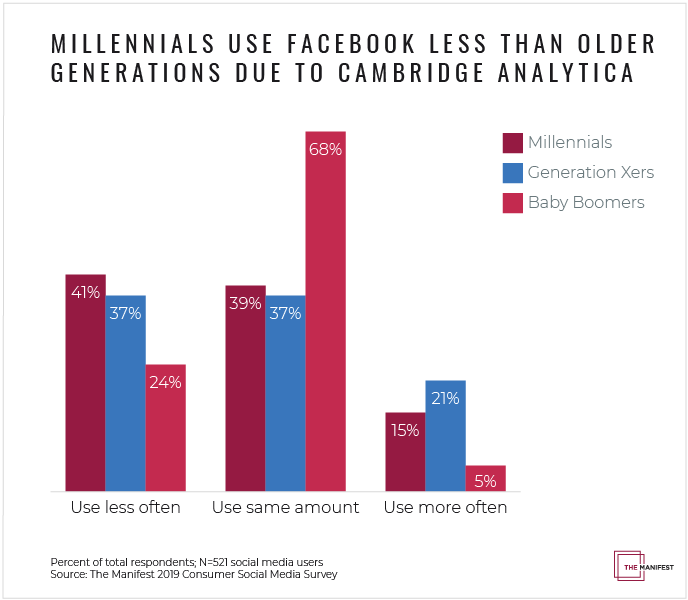How People View Facebook After the Cambridge Analytica Data Breach

How People View Facebook After the Cambridge Analytica Data Breach
Two-thirds of social media users are aware of Cambridge Analytica’s privacy breach that made news headlines one year ago in March 2018, but just under half view Facebook negatively as a result.
In March 2018, The New York Times broke the story that political consulting firm Cambridge Analytica acquired the personal data of more than 50 million Facebook users without their permission.
What followed the news revelation was a drastic decrease in Facebook’s trustworthiness – just 27% of people trusted Facebook immediately following the Cambridge Analytica scandal, down from 79% the previous year.
But does the privacy breach still affect how people use and view Facebook?
The Manifest surveyed 521 social media users to learn if the Cambridge Analytica data breach still influences their Facebook usage.
Businesses can use this report to help create a transparent Facebook strategy that eases consumer privacy concerns.
Our Findings
- Nearly two-thirds of social media users (65%) are familiar with Cambridge Analytica’s Facebook data breach that made headlines in March 2018.
- The Cambridge Analytica scandal continues to impact how people view Facebook – nearly half of social media users (44%) view Facebook more negatively, including 15% who view it much more negatively.
- More than one-third of people (37%) use Facebook less as a result of the Cambridge Analytica scandal, which shows that people still use Facebook even if they have a negative opinion of it.
- The scandal impacted millennials most, with 41% of the generation using Facebook less since the data breach, compared to 37% of Generation Xers and 24% of baby boomers.
Most People Are Familiar With Cambridge Analytica’s Data Breach on Facebook
Social media users are still aware of the Cambridge Analytica scandal – 65% are familiar with the data breach.

Experts say the Cambridge Analytica data breach made a big impact on Facebook users solely because it garnered so much news coverage.
“To me, it’s amazing that more than half of U.S. social media users are aware of one single company and its actions,” said Josh Krakauer, founder and CEO of Sculpt, a social media marketing agency in Iowa. “That’s a pretty big deal.”
Although Cambridge Analytica is a single company, its data breach remains memorable to social media users.
Nearly Half of Social Media Users View Facebook More Negatively After the Cambridge Analytica Data Breach
The Cambridge Analytica news left a lasting impression on many social media users.
Forty-four percent (44%) view Facebook more negatively since news of the data breach broke.

The Cambridge Analytica scandal ruined many consumers’ trust in Facebook.
“Facebook really tried to give an image that this type of thing wasn’t happening, that their data was safe,” said Steve Pearson, CEO of Friendemic, an online reputation company in Salt Lake City. “To see something like this come out, it was a blow to many consumers who were otherwise trusting.”
It was a blow to many consumers who were otherwise trusting.
People became more cautious of where Facebook shared their data, which caused people to view the platform more negatively.
Some businesses also view Facebook more negatively because of the Cambridge Analytica data breach, including Storage Vault, a self-storage company based in Scotland.
“I think the Cambridge Analytica scandal was the final straw for us when it came to using Facebook as a marketing platform for our business,” Commercial Director Kraig Martin said. “We definitely view the platform more negatively following the scandal, and we’ve drastically scaled back our operations on it.”
Storage Vault used to post on Facebook twice a day but now posts just once a week as a result of the Cambridge Analytica news.

Storage Vault scaled back its Facebook operations because Martin does not think the platform has a right to share users’ private information.
“I think tech companies have a moral obligation to protect a person’s information,” he said.
Martin believes that businesses like Facebook should not give people’s information to other companies without each person’s explicit consent.
Both people and businesses view Facebook more negatively after news broke about Facebook’s invasion of privacy with Cambridge Analytica, and some are changing how they use Facebook as a result.
One-Third of People Use Facebook Less Often Due to the Cambridge Analytica Data Breach
Although about half of social media users view Facebook more negatively because of the Cambridge Analytica data breach, only about one-third use Facebook less often.
About 37% of social media users use Facebook less frequently as a result of Cambridge Analytica, but 42% use it the same amount, and 16% use it more often.

Many people complained about the Cambridge Analytica scandal, but they did so by posting on Facebook.
“People like paying lip service to privacy,” said Chad Richards, vice president of social media services at Firebelly Marketing, a social media marketing agency in Indianapolis. “Where are we seeing people complain about Facebook privacy and the Cambridge Analytica scandal? On Facebook of all places."
Where are we seeing people complain about Facebook privacy and the Cambridge Analytica scandal? On Facebook of all places.
People may not like that their privacy was violated, but many don’t see it as enough of a reason to decrease their Facebook usage.
“While they may say they have concerns, I don’t think it’s been enough for many of them to use Facebook less,” Richards said. “That ‘Quit Facebook’ movement lost steam.”
Data suggests that the Cambridge Analytica scandal isn’t hurting Facebook as much as many people initially thought it would. About two months after the data breach, 74% of Facebook users had either taken a break from the platform, changed their privacy settings, or deleted it.
However, as time passes, many people still use Facebook as often as before the data breach. Facebook is still the most-used social media channel, and 52% of social media users say they access Facebook more frequently than any other social media channel.
“Facebook is integrated into people’s lives so deeply that it’s kind of hard to get out of the ecosystem,” said Keith Kakadia, founder and CEO of Sociallyin, a social media agency in Birmingham, Ala. “You know the data sharing is an issue, but the entertainment and the connection outweigh the security breach side of it.”
Facebook is integrated into people’s lives so deeply that it’s kind of hard to get out of the ecosystem.
It’s hard for people to leave Facebook because it is such a big part of the average social media user’s life. This is why many businesses still use Facebook, too.
Alexander Advertising, an advertising agency in the United Kingdom, has not changed its Facebook strategy due to the Cambridge Analytica data breach.
“We continue to use Facebook as frequently as we did before,” said Katharine Pebworth, a digital marketer at Alexander Advertising. “We haven’t seen a huge difference in our engagement rates and continue to incorporate Facebook into all our digital marketing campaigns and strategies.”
Facebook is still an important part of Alexander Advertising’s social media strategy, and the company has not noticed a decrease in engagement or loss of followers.

If anything, the data breach helped build trust among Alexander Advertising’s follower base.
“People are more aware of who they are following and why,” Pebworth said. “This means that if people are engaged with our page, they are more trusting.”
Richards, too, has noticed that people are changing their approach to Facebook but not necessarily decreasing their usage.
“We’ve seen a steady decline in wall posts on brands’ Facebook pages,” Richards said. “We’ve seen a big increase in direct messages. Instead of people posting their complaints publicly on a company’s wall, we’re seeing a huge uptick in private messages.”
People are now more likely to communicate with brands through private messaging rather than making their interactions public. This benefits businesses because they can handle unhappy customers privately, without other customers seeing.
Although around one-third of people use Facebook less as a result of Cambridge Analytica, the majority still use Facebook as frequently or more often, even if how they use the platform changed.
The Cambridge Analytica Data Breach Turned Younger Generations off of Facebook
The data breach influenced younger generations' use of Facebook more than older generations.
Forty-one percent (41%) of millennials use Facebook less often because of the Cambridge Analytica scandal, compared to 37% of Generation Xers and 24% of baby boomers.

Older generations tend to use Facebook as their main social media platform, so they may feel like they would be missing out if they left Facebook.
Meanwhile, millennials are often active on multiple social media channels, so leaving Facebook doesn’t impact their online communication as much, according to Krakauer
“When [millennials] leave Facebook, they don’t fully lose the information and sense of belonging that they have on social media,” Krakauer said. “It doesn’t feel like a lifeline was totally cut off for some of them, where it might for an older user.”
The younger generations, who are active on several social channels, likely didn’t feel as much of a sacrifice when deciding to use Facebook less as a result of the Cambridge Analytica scandal.
Although the scandal deterred many millennials from Facebook, Pebworth said it may also be for reasons beyond Cambridge Analytica.
“The way I use Facebook has changed slightly over the last year, but I think this is an indication of an increased use of Instagram and Twitter in my social circles rather than as a direct result of the Cambridge Analytica scandal,” she said.
Pebworth has also noticed that millennials as a whole are less alarmed by data breaches.
“I think my generation has always been subtly aware of the data risks that social media proposes and therefore have not changed their habits as much as a direct result of the data breach,” she said.
Millennials are more digitally savvy than older generations, so they are more aware that sites share their information.
However, businesses need to become more transparent on Facebook for all generations.
“Transparency and authenticity really do matter to people,” Richards said. “You want to be accessible and responsive, too, if people have questions. Brands really need to improve their community management efforts and improve their response rates and times to build trust.”
Transparency and authenticity really do matter to people.
Facebook is still a successful strategy for businesses, but it’s important for social media managers to make their company’s profile transparent and responsive to appeal to all generations. Working with a social media agency can help businesses create a strategy that builds consumer trust.
Facebook Is Still Strong One Year After the Cambridge Analytica Data Breach
The Cambridge Analytica scandal did not kill Facebook, like many people believed it would.
The data breach made many people view Facebook more negatively, but the majority of people still use Facebook with the same frequency or more often than before the breach.
Millennials tend to use Facebook less often after the Cambridge Analytica news broke, but people across generations still widely use Facebook.
Businesses need to ease consumer privacy concerns by being as transparent as possible on Facebook and other social media channels.
About the Survey
The Manifest surveyed 521 people from across the U.S. who have used social media in the past week.
Sixty-five percent (64%) of survey respondents are female; 36% are male.
About 42% are millennials (ages 18-34), 36% are Generation X (ages 35-54), and 22% are baby boomers or older (ages 55+).
Most survey respondents are employed either full-time (42%) or part-time (13%). Others are homemakers (13%), retired (13%), self-employed (5%), students (4%), unemployed and currently looking for work (5%), or unemployed and not currently looking for work (5%).
Survey respondents’ education levels are 8th grade or lower (1%), some high school (5%), high school graduate or equivalent (23%), some college credit, no degree (25%), associate’s degree (13%), bachelor’s degree (21%), and master’s degree or higher (12%).
Respondents are from the South (38%), Midwest (24%), Northeast (21%), and West (17%).
